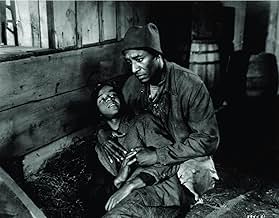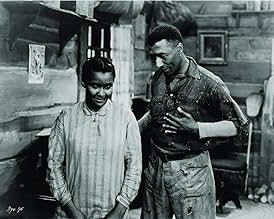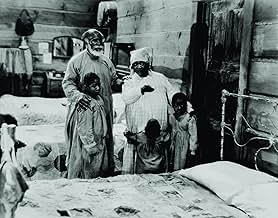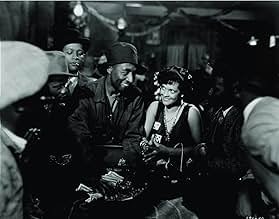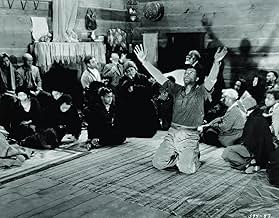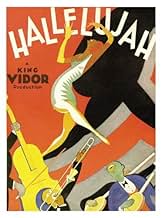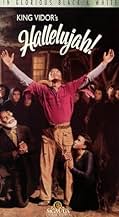IMDb RATING
6.7/10
2.1K
YOUR RATING
A sharecropper decides to become a preacher after falling for a vamp from the city.A sharecropper decides to become a preacher after falling for a vamp from the city.A sharecropper decides to become a preacher after falling for a vamp from the city.
- Nominated for 1 Oscar
- 3 wins & 1 nomination total
Matthew 'Stymie' Beard
- Child
- (uncredited)
Evelyn Pope Burwell
- Singer
- (uncredited)
Eddie Conners
- Singer
- (uncredited)
William Allen Garrison
- Heavy
- (uncredited)
Eva Jessye
- Singer
- (uncredited)
Sam McDaniel
- Adam
- (uncredited)
Clarence Muse
- Church Member
- (uncredited)
Featured review
I probably don't need to go into the historical facts about this movie or the plot, as this had probably been expunded in numerous other comments. Personally I think that Hallelujah is a beautiful and powerful film, sympathetic to African Americans, and I think it's remarkable that it was produced at all.
Hallelujah is a huge production, with hundreds of extras. The cast was made up of mostly unknowns. Cast members like Fally Belle McKnight and Victoria Spivey apparently never made any other films, and leads Daniel L. Haynes and Nina Mae McKinney were obviously getting started. The cast is very good, I thought, especially Spivey (a veteran of the stage) as Rose. Haynes is okay in the beginning, seeming a little uneven in his role as well-meaning rogue Zeke, but the final scenes allow him to prove the commanding presence he could muster as an screen presence. Nina Mae McKinney is a power-house. A short, curvy beauty with an interesting voice, she has something of a young Myrna Loy. In fact, I just recently saw a still from a Loy film called The Squall where Loy looks an awful lot like McKinney.
Movies like Hallelujah are an acquired taste. When I first saw it, I was distracted by the crudeness of the sound, the jagged editing and the overall unevenness of the movie. Sure, two or three years later, Hollywood was turning out glossy productions like Red Dust and Blond Venus, with highly polished editing, clear sound and more mobile camera-work, but this is 1929. Sound film-making techniques had yet to be smoothed out. The crinkles of a young process actually add charm to this film, if you know to expect them.
I'll admit as well that, when I first saw Hallelujah, I was irritated by the voices. There's a lot of screeching from the women, and a great deal of mumbling as well. A second viewing, though, allows one to see past these "irritating" aspects and appreciate the voices for what they are. This way, Fanny Belle McKnight's agonized cries of sorrow and her singing the children to sleep is more touching than it is grating.
It's hard to know what else to say about the film. For all it's shortcomings, it's a touching film, lyrical even. I think it's a wonderful production, and I doubt it would not have been made much differently by a black director. Plus, one must agree, King Vidor was a far better craftsman than Oscar Micheaux. 9/10
Hallelujah is a huge production, with hundreds of extras. The cast was made up of mostly unknowns. Cast members like Fally Belle McKnight and Victoria Spivey apparently never made any other films, and leads Daniel L. Haynes and Nina Mae McKinney were obviously getting started. The cast is very good, I thought, especially Spivey (a veteran of the stage) as Rose. Haynes is okay in the beginning, seeming a little uneven in his role as well-meaning rogue Zeke, but the final scenes allow him to prove the commanding presence he could muster as an screen presence. Nina Mae McKinney is a power-house. A short, curvy beauty with an interesting voice, she has something of a young Myrna Loy. In fact, I just recently saw a still from a Loy film called The Squall where Loy looks an awful lot like McKinney.
Movies like Hallelujah are an acquired taste. When I first saw it, I was distracted by the crudeness of the sound, the jagged editing and the overall unevenness of the movie. Sure, two or three years later, Hollywood was turning out glossy productions like Red Dust and Blond Venus, with highly polished editing, clear sound and more mobile camera-work, but this is 1929. Sound film-making techniques had yet to be smoothed out. The crinkles of a young process actually add charm to this film, if you know to expect them.
I'll admit as well that, when I first saw Hallelujah, I was irritated by the voices. There's a lot of screeching from the women, and a great deal of mumbling as well. A second viewing, though, allows one to see past these "irritating" aspects and appreciate the voices for what they are. This way, Fanny Belle McKnight's agonized cries of sorrow and her singing the children to sleep is more touching than it is grating.
It's hard to know what else to say about the film. For all it's shortcomings, it's a touching film, lyrical even. I think it's a wonderful production, and I doubt it would not have been made much differently by a black director. Plus, one must agree, King Vidor was a far better craftsman than Oscar Micheaux. 9/10
- Kieran_Kenney
- Jul 20, 2004
- Permalink
Storyline
Did you know
- TriviaAlthough this film is frequently touted as the first black-cast film produced in Hollywood, it is actually predated by the more obscure Hearts in Dixie (1929).
- GoofsWhen Zeke confronts Chick and Hot Shot and strong-arms them in front of the crowd, the shadow of the microphone falls across Hot Shot as he is pushed to the background of the scene and tries to regain his composure. The shadow of the boom is also visible falling across the extras behind him.
- Alternate versionsMGM also issued this movie in a silent version, with Marian Ainslee writing the titles.
- SoundtracksSometimes I Feel Like a Motherless Child
(uncredited)
Traditional Spiritual
Sung offscreen during the opening credits
- How long is Hallelujah?Powered by Alexa
Details
- Runtime1 hour 49 minutes
- Color
- Aspect ratio
- 1.20 : 1
Contribute to this page
Suggest an edit or add missing content









